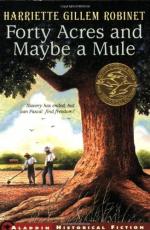|
This section contains 132 words (approx. 1 page at 300 words per page) |

|
Robinet's story ably dramatizes the atrocities of plantation life and the South's continuing hatred of its freed slaves. The plantation master and overseer are despicable.
Night riders lynch hard-working farmers simply because they are ex-slaves. Ne'erdo-wells in carriages malign President Lincoln's policies.
Through the events surrounding Pascal, readers see that neither war nor law change social attitudes. The legislation first gave and then took away the ex-slaves' land grants. Similarly, Pascal's story has no happy ending. As Robinet points out in her Author's Note, out of 40,000 freed slaves who were awarded farm land, all but 1,565 lost the land. By 1877, most of the land returned to the hands of the former slave owners. Northern troops, Abolitionists, and even the Supreme Court abandoned the cause of freedom for the ex-slaves.
|
This section contains 132 words (approx. 1 page at 300 words per page) |

|




